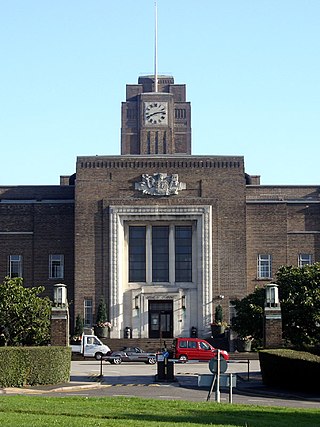Related Research Articles

This page gives an overview of the complex structure of environmental and cultural conservation in the United Kingdom.

The Wildlife and Countryside Act 1981 is an act of Parliament in the United Kingdom implemented to comply with European Council Directive 79/409/EEC on the conservation of wild birds. In short, the act gives protection to native species, controls the release of non-native species, enhances the protection of Sites of Special Scientific Interest and builds upon the rights of way rules in the National Parks and Access to the Countryside Act 1949. The act is split into 4 parts covering 74 sections; it also includes 17 schedules.
Keith Gilbert Robbins was a British historian and Vice-Chancellor of the University of Wales, Lampeter. Professor Robbins was educated at Bristol Grammar School, Magdalen, and St Antony's College, Oxford.
The Freshwater Biological Association (FBA) is an independent scientific organisation founded in 1929 in Cumbria by Felix Eugen Fritsch, William Harold Pearsall, Francis Balfour-Browne, and Robert Gurney among others. Whilst originally created to be a research station it has evolved into a learned society whose mission is "to promote the sustainable management of freshwater ecosystems and resources, using the best available science". It works closely alongside other organisations, notably Natural Environment Research Council. The FBA promotes freshwater science through innovative research, maintained specialist scientific facilities, a programme of scientific meetings, production of publications, and by providing sound independent scientific opinion.
Sir Roy Malcolm Anderson is a leading international authority on the epidemiology and control of infectious diseases. He is the author, with Robert May, of the most highly cited book in this field, entitled Infectious Diseases of Humans: Dynamics and Control. His early work was on the population ecology of infectious agents before focusing on the epidemiology and control of human infections. His published research includes studies of the major viral, bacterial and parasitic infections of humans, wildlife and livestock. This has included major studies on HIV, SARS, foot and mouth disease, bovine tuberculosis, bovine spongiform encephalopathy (BSE), influenza A, antibiotic resistant bacteria, the neglected tropical diseases and most recently COVID-19. Anderson is the author of over 650 peer-reviewed scientific articles with an h-index of 125.

Sir John Boothman StuttardKStJ JP FCA is an English chartered accountant who was Lord Mayor of the City of London from 2006 to 2007.

Sir Leszek Krzysztof Borysiewicz is a British professor, immunologist and scientific administrator. He served as the 345th Vice-Chancellor of the University of Cambridge, his term of office started on 1 October 2010 and ended on 1 October 2017. Borysiewicz also served as chief executive of the Medical Research Council of the UK from 2007-2010 and was the chairman of Cancer Research UK from 2016 to 2023.
Geraint Talfan Davies OBE DL FRIBA FLSW is a Welsh journalist and broadcaster, and a long-serving trustee and chairman of many Welsh civic, arts, media and cultural organisations.
Richard J. Hobbs FAA, is an Emeritus Professor, ARC former Australian Laureate Fellow and ecologist at the University of Western Australia, Perth, Australia. He is a fellow of the Australian Academy of Science and a Highly-Cited author who has written extensively in the areas of vegetation dynamics and management, ecosystem fragmentation, ecosystem rehabilitation and restoration, landscape ecology, and conservation biology. His research focused on managing ecosystems in a rapidly changing world and the implications of environmental and biological change for conservation and restoration.
Peter Cullen AO FTSE, MAgrSc, DipEd (Melb), Hon DUniv (Canb), was a leading Australian water scientist.
Wildlife and Countryside Link (Link) is the largest environment and wildlife coalition in England, bringing together voluntary organisations in the UK to protect wildlife, restore landscapes and the marine environment, and improve access to nature.
Ian Richard Swingland is a British conservationist, convicted in 2017 of conspiring to commit fraud by false representation. He founded DICE at the University of Kent in 1989, recognised as one of the first interdisciplinary research and postgraduate training institutes in the world concentrating on biodiversity, communities and sustainable development. While at DICE he served as director and was elected to the first chair in Conservation Biology in the United Kingdom.

Sir Ian David Diamond FLSW is a British statistician, academic, and administrator, who served as Principal and Vice-Chancellor of the University of Aberdeen until 2018. He became the UK's National Statistician in October 2019.

Sir Ian Lamont Boyd, is a Scottish zoologist, environmental and polar scientist, former Chief Scientific Adviser at the Department for Environment, Food and Rural Affairs (DEFRA) and is a professor of biology at the University of St Andrews. He is Chair of the UK Research Integrity Office and President of the Royal Society of Biology.

Colin Bryan Riordan FLSW is a British academic who was formerly President and Vice-Chancellor of Cardiff University from September 2012 to August 2023.

Keith G. Harding CBE FRCGP FRCP FRCS FLSW is a British physician.
Paul Greenhalgh is a British historian, writer, museologist, and curator of art and design.
Mike (Michael) Edmunds FAS FInstP FLSW is a British astrophysicist, known for his research on the interpretation of the chemical composition of the Universe and the origin of interstellar dust.
Rosemary S. Hails is a British population ecologist and entomologist and the current Director of Science and Nature at the National Trust for Places of Historic Interest or Natural Beauty. Prior to this appointment she was the Director of Biodiversity and Ecosystem Science for UK Centre for Ecology and Hydrology, managing and directing the science of 350 ecologists and hydrologists, in collaboration with the Science Director for Water and Pollution Science. Professor Hails successfully led the development of UKCEH's national capability research programme delivered by the Research Centre, which cuts across the complete portfolio of expertise. She has led the Valuing Nature Programme for NERC, since October 2014, and is currently a CoInvestigator in the NERC Funded "RENEW" and "RestReco" Projects. In 2000, she was made a Member of the Most Excellent Order of the British Empire (MBE) for services to environmental research.

Michael William Bruford was a Welsh molecular ecologist, conservation biologist and a professor at Cardiff University's School of Biosciences. His area of research spanned from animal wildlife genetics to the management of captive populations and livestock breeds to animal biobanking. After earning his B.Sc. from the University of Portsmouth and his PhD from the University of Leicester, Bruford worked at the Zoological Society of London where he became Head of Conservation Genetics before joining Cardiff University as reader in 1999 and professor in 2001. In addition to his research activities at Cardiff University, he was also director of the Frozen Ark project, which seeks to preserve threatened animal species by means of cryopreservation.
References
- 1 2 Smithers, Rebecca (23 February 2012). "Tesco and RSPB join forces to protect rainforests". The Guardian. Retrieved 13 August 2014.
- 1 2 3 4 5 O'Kane, Simone (4 March 2013). "New RSPB boss discovered love of nature growing up in Burnley". Lancashire Telegraph. Retrieved 22 June 2014.
- ↑ Ormerod, S. J. (1985). Thesis Details – The distribution of macroinvertebrates in the upper catchment area of the River Wye in relation to ionic composition. British Library EThOS (Ph.D). Retrieved 30 June 2014.
- ↑ Who' Who. A & C Black. 2014. ISBN 978-1408-1-8119-5.
- 1 2 3 4 5 "The RSPB: News: RSPB elects Cardiff Professor as new chairman". RSPB. 8 October 2012. Retrieved 22 June 2014.
- 1 2 "Professor Steve Ormerod FCIEEM, FLSW, FSB". Winston Churchill Memorial Trust. Archived from the original on 14 August 2014.